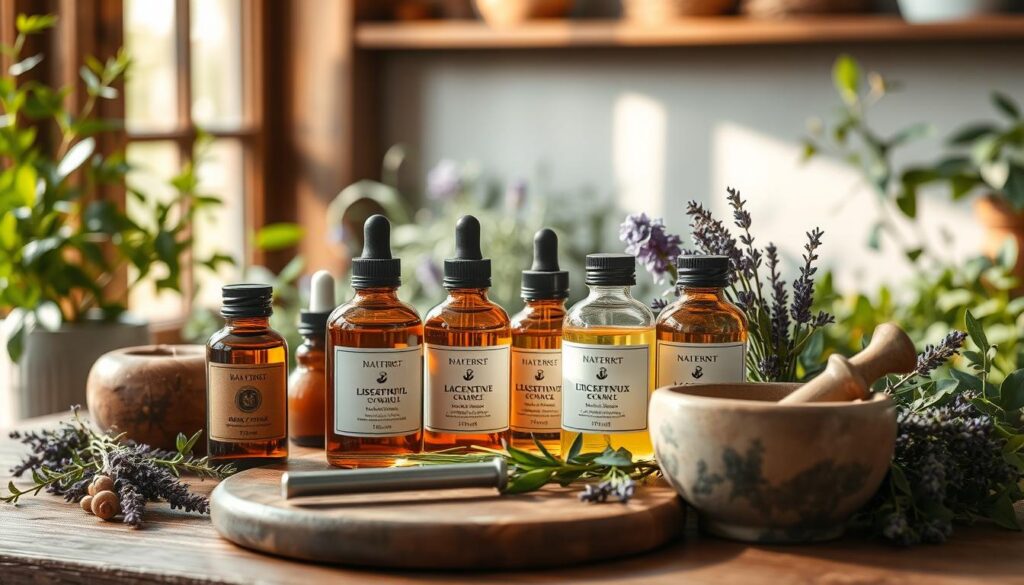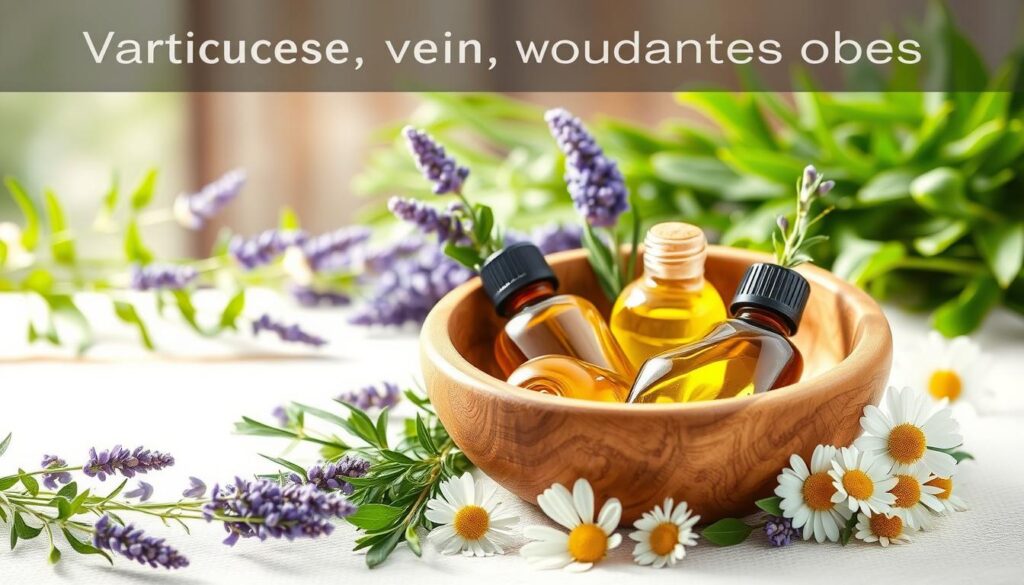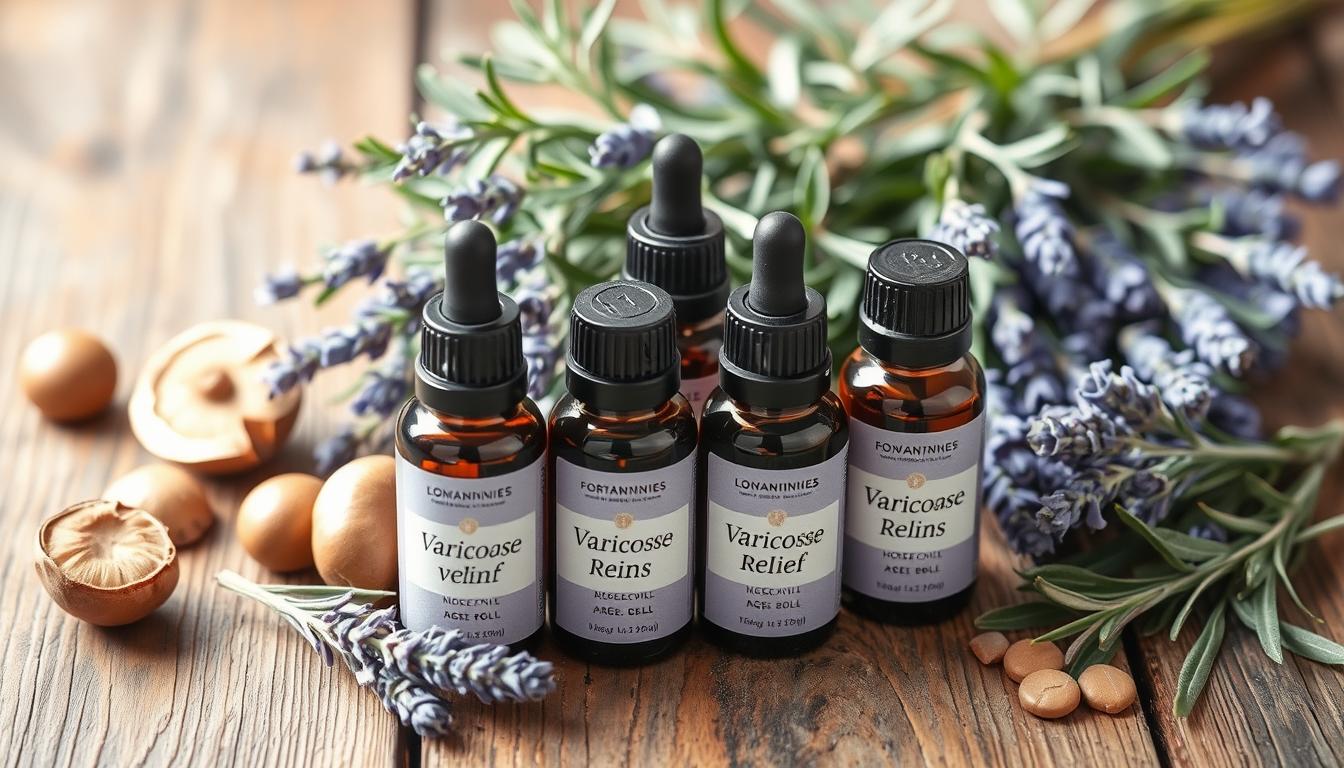Are you tired of dealing with varicose veins? They can be uncomfortable and unsightly. Natural essential oils might help soothe your symptoms and improve vein health. This guide will explore the science behind essential oils and the top natural remedies for varicose veins.
Key Takeaways
- Certain essential oils, like lavender, helichrysum, and cypress, can help reduce swelling, pain, and inflammation from varicose veins.
- Making a homemade essential oil blend is a natural and affordable way to manage varicose vein symptoms, alongside other treatments.
- Essential oils must be diluted correctly and used with care, as they can cause skin irritation or sensitivity in some people.
- It’s wise to consult a healthcare professional for proper diagnosis and treatment of varicose veins. Essential oils should not replace medical care.
- Changing your lifestyle, like exercising regularly, wearing compression stockings, and eating healthy, can also help manage varicose vein symptoms.
Understanding Varicose Veins and Their Symptoms
Varicose veins are a common vein problem. They happen when the valves in veins break down. This makes veins look enlarged, twisted, and visible under the skin.
This can cause a range of uncomfortable symptoms. These symptoms can really affect your daily life.
Common Signs and Risk Factors
The most common signs include visible dark or blue veins. You might also feel itchiness, swelling, and a heavy, achy feeling in your legs.
Things that can increase your risk include genetics, sitting or standing for a long time, being overweight, and wearing tight clothes. These can all affect blood flow.
Impact on Daily Life
Varicose veins can really impact your daily life. They can cause discomfort, make you feel self-conscious, and even make it hard to walk or exercise.
The pain and swelling can make even simple tasks hard. This can really affect your quality of life.
When to Seek Professional Help
While self-care can help, it’s key to see a doctor if symptoms get worse. A healthcare provider can check how bad your varicose veins are.
They can then suggest the best treatment. This might include lifestyle changes, medication, or even procedures.
| Symptom | Cause | Impact |
|---|---|---|
| Visible, twisted veins | Weakened vein valves | Cosmetic concerns, self-consciousness |
| Itchiness, swelling | Pooling of blood in the veins | Discomfort, difficulty with daily activities |
| Heaviness, aching in the legs | Impaired blood circulation | Reduced mobility, decreased quality of life |
Understanding varicose veins can help you manage symptoms and get the right treatment. This can improve your comfort and quality of life. It helps address the vein health issues.
The Science Behind Essential Oils for Vein Health
Research on essential oils for varicose veins is still in its early stages. Yet, some studies hint at their potential benefits. Lavender oil might help with pain and reduce ulcer time. Rosemary oil could improve blood flow.
Oils like cypress, grapefruit, and lemongrass might boost circulation. Chamomile and frankincense could fight inflammation.
Ayurvedic medicine, dating back to 3000 BC in India, values essential oils for vein health. In the US, herbal therapy draws from European and Chinese traditions. In 1997, alternative medicine saw more visits than primary care.
“Approximately $27 billion was spent on alternative therapies in the US in 1997, with $3.24 billion spent on herbal therapy. Around 50% of the US population uses some form of alternative medicine.”
The Dietary Supplement Health and Education Act of 1994 set standards for herbs in the US. In Germany, herbs are classified by safety levels, with Class 1 being safe.
Conditions like atherosclerosis, blood clot, and diabetes can benefit from essential oils. Oils like cypress, peppermint, and rosemary improve circulation.
Essential oils are also used for facial spider veins. These veins are thinner and flat, appearing anywhere on the body. For varicose or spider veins, oils like lavender and horse chestnut are used. Parsley, rose, and marigold are good for spider veins on the face.
Top Essential Oils for Treating Varicose Veins
Essential oils can be a great natural remedy for varicose veins. They are concentrated plant extracts that help improve circulation, reduce inflammation, and ease pain. Let’s look at some of the best essential oils for varicose vein relief.
Helichrysum Oil Benefits
Helichrysum oil is great for varicose veins because it fights inflammation and boosts circulation. It can make spider veins less visible and ease the discomfort of twisted veins.
Cypress and Circulation Support
Cypress oil helps keep blood flowing well, preventing it from pooling in veins. This can reduce the heaviness and swelling of varicose veins.
Chamomile for Pain Relief
Chamomile oil helps ease pain and heaviness in the legs. It’s perfect for people who stand a lot or have varicose vein pain. Its soothing and anti-inflammatory properties offer much-needed relief.
Other good essential oils for varicose veins include lemongrass, peppermint, and ginger. Lemongrass boosts blood flow, peppermint cools tense muscles, and ginger fights inflammation. Adding these natural remedies to your routine can improve your overall health.
| Essential Oil | Key Benefits for Varicose Veins |
|---|---|
| Helichrysum | Anti-inflammatory, promotes circulation |
| Cypress | Improves blood flow, reduces swelling |
| Chamomile | Relieves pain and heaviness in legs |
| Lemongrass | Enhances blood circulation |
| Peppermint | Provides cooling relief for tense muscles |
| Ginger | Reduces inflammation |
Adding these essential oils to your routine can greatly benefit your health. Each oil has unique benefits. Find out which ones work best for you.
Varicose Veins Essential Oil Blend Recipe by Smoketree Massage and Apothecary
Looking for natural relief for varicose veins? Smoketree Massage and Apothecary has just what you need. Their “TAME THE TIGER: VARICOSE VEIN SALVE” helps with pain, inflammation, discoloration, and blood pooling in leg veins.
The salve uses horse chestnut oil and helichrysum essential oil. Horse chestnut oil lowers blood pressure in leg veins. Helichrysum oil fights inflammation. Together, they soothe and improve blood flow.
| Ingredient | Benefits |
|---|---|
| Horse Chestnut Oil | Reduces high blood pressure in leg veins |
| Helichrysum Essential Oil | Powerful anti-inflammatory properties |
Need a homemade varicose vein cream or a natural varicose veins essential oil blend recipe? Smoketree Massage and Apothecary’s “TAME THE TIGER: VARICOSE VEIN SALVE” is a great choice. Take care of your veins with this natural blend.

Application Methods and Usage Guidelines
There are many ways to use essential oils for varicose vein relief. One method is to make a warm or cool compress. Mix 5 drops of essential oil with 1 liter of water. Apply it to the affected area for soothing relief and to promote healthy circulation.
For a more focused approach, mix up to 30 drops of essential oils with 3 tablespoons of carrier oil. Use jojoba or coconut oil. Gently massage the mixture into the veins, always moving towards your heart. This method helps the oils reach deeper, addressing the root cause.
Massage Techniques
Adding massage techniques can boost the effect of essential oils on varicose veins. Use gentle, circular motions when massaging the area. Apply enough pressure to stimulate circulation without causing pain. This method helps the oils penetrate and relieves muscle tension, improving leg health.
Compression Methods
Using compression methods along with essential oils can offer extra support for varicose veins. Wearing compression stockings or using a compression wrap can improve blood flow and reduce swelling. This enhances the benefits of your essential oil routine.
Safety Precautions
Essential oils should always be diluted before use. They can be strong and may irritate the skin if not diluted. Always do a patch test on a small area of skin before applying the essential oil blend to the whole area. Also, avoid using essential oils during pregnancy or breastfeeding without consulting a healthcare professional.
By following these guidelines, you can safely and effectively use essential oils for varicose vein relief. This supports natural relief and overall vein health.
Complementary Natural Remedies and Lifestyle Changes
Essential oils are great for varicose veins, but there’s more you can do. Natural remedies and lifestyle changes can help too. These methods work together to improve your vein health.
Lifestyle Modifications for Vein Health
Changing your daily habits can help with varicose veins. Avoid sitting or standing for too long. Being overweight can also strain your veins.
Wear loose clothes and elevate your legs to boost blood flow. This can make a big difference.
Exercise is key, especially low-impact activities. Walking, swimming, or cycling strengthens your muscles. Compression stockings also help by improving blood flow.
Dietary Considerations for Vein Health
- Eat more fiber to keep your bowels healthy and veins less strained.
- Drink less salt to avoid swelling and fluid retention.
- Add foods like berries and leafy greens to your diet. They’re good for your veins.
Herbal Remedies for Vein Health
Some herbal supplements can help your veins too. Horse chestnut, butcher’s broom, and grape seed extract are good options. They can improve circulation and reduce swelling.
Always talk to a doctor before trying new supplements or changing your diet. Everyone’s needs are different.

Essential oils, natural remedies, and lifestyle changes can help manage varicose veins. It’s important to be consistent and patient. Improving your veins takes time and effort.
Horse Chestnut and Other Supporting Ingredients
Horse chestnut is a strong ally in treating varicose veins. It has been shown to lower blood pressure in leg veins and ease poor circulation symptoms. A 2006 study found it helps reduce heaviness, pain, and itchiness in varicose veins.
Scientific Evidence
Other natural ingredients also support vein health. Butcher’s broom, for example, helps reduce leg swelling from poor circulation. Grape seed extract may make blood vessels more elastic, helping prevent swelling.
Recommended Combinations
Combining natural ingredients can be very effective. Some top combinations include:
- Horse chestnut, butcher’s broom, and grape seed extract for reducing swelling and improving circulation
- Lavender, cypress, and chamomile essential oils for soothing pain and promoting vein health
- Apple cider vinegar, cayenne pepper, and olive oil for improving circulation and reducing inflammation
While these ingredients offer great support, they shouldn’t replace medical advice. Always talk to your doctor before adding new supplements or treatments.
“Horse chestnut extract has been suggested to reduce leg pain, swelling, and itching associated with chronic venous insufficiency in some studies.”
Conclusion
Essential oils and natural remedies can help with varicose vein symptoms for a short time. But, they are not a long-term fix. You should talk to a vascular specialist for lasting relief.
Your doctor might suggest treatments like sclerotherapy or laser surgery. They could also recommend vein stripping or phlebectomy. Or, they might suggest endoscopic surgery.
Using natural remedies like essential oils with medical advice can help manage symptoms. It’s important to follow your doctor’s advice. Also, keep a healthy lifestyle by exercising, managing your weight, and not sitting or standing for too long.
This way, you can reduce discomfort and improve the look of varicose veins. Talking to your vascular specialist is key. They can help create a plan that meets your needs.

